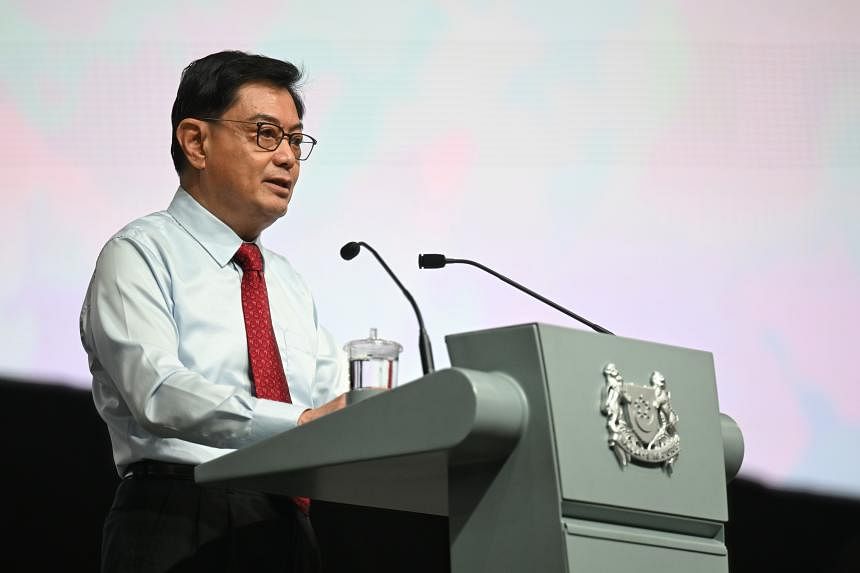SINGAPORE - Public servants must be willing to rethink government policies and the ways in which they are implemented, rather than only working to streamline those that already exist, said Deputy Prime Minister Heng Swee Keat on Thursday. By doing so, the public service will make a positive difference to Singaporeans, he added.
Speaking to more than 750 public service leaders at the Expo Apex Hall during the Annual Public Service Leadership Ceremony, Mr Heng, who is also Coordinating Minister for Economic Policies, underscored the importance of public servants having a good sense of the ground. This must be coupled with empathy and a willingness to do things differently if necessary, he added.
He listed some innovative policy changes that have bettered the lives of Singaporeans, or will do so when implemented. These include ComLink family coaches who, going forward, will act as a point of contact for lower-income families across various government programmes. The ComLink scheme coordinates support for poor families facing multiple social issues.
Mr Heng also highlighted new automated lanes at the Republic’s checkpoints. These will allow Singapore residents and visitors to clear immigration without a passport when the lanes are implemented by the Immigration and Checkpoints Authority in stages from 2024.
“As the age-old public service wisdom goes – policy is implementation. We must both design good policies and deliver them well. This is how we sustain and renew trust with citizens,” said Mr Heng, who was the guest of honour at the awards ceremony.
The public service employs about 150,000 public officers across 16 ministries and more than 50 statutory boards. This includes the civil service, which comprises about 86,000 officers working in the ministries.
Civil service head Leo Yip echoed Mr Heng’s call for the public service to be willing to evolve and stressed the need to “relentlessly improve and transform” the way it works, to spare no effort to develop its people, and for leaders to show the way by developing themselves to lead better.
“In a changing world, our leadership must remain adaptive whilst we stay anchored on our purpose and our values... These are fundamental areas of focus for us to become better individuals, better leaders and collectively, a better public service,” said Mr Yip.
Mr Heng added that amid the rise of identity politics in a post-truth world, the public service cannot take Singapore’s success for granted and must continue to invest in good governance and leadership. It must sustain trust and strengthen the shared sense of purpose with the political leadership since its ethos of integrity, service and excellence are shared by both entities, he added.
“For the political leadership to give expression to the will of the people, we must work closely with the public service to develop policies and programmes. In turn, the public service must do its best to implement and execute well,” he added.
Mr Heng noted that as Singapore undergoes a political leadership transition, he and his colleagues will look to the public service to continue to serve with distinction and professionalism.
Another suggestion Mr Heng had was for public service officers to better engage with citizens.
“As demographics and aspirations change, we must move beyond engagement and facilitate an active citizenry that contributes to and enables more robust policymaking amid a more diverse and complex backdrop,” he said.
Mr Heng listed the Alliances for Action (AfA) coalition as a good model to engage citizens.
The AfA brings together stakeholders from different sectors to discuss and devise solutions to various challenges.
The AfA for Lower-Wage Workers, for example, brought passionate citizens, young people, union members, businesses and community groups together to pilot and scale up programmes to uplift lower-wage workers, said Mr Heng.
The value of such a method is that it gets like-minded citizens and stakeholders involved to contribute together, thus building a sense of shared ownership, he added.
Mr Heng noted that the Forward SG exercise engagements took on more innovative and participatory methods like citizen panels.
The report on the public consultation exercise to refresh Singapore’s social compact will be released soon, and the public service must think of ways to operationalise its call to action for Singaporeans, he said.
“By enhancing partnership with our citizens, especially our younger generations, to build a better Singapore for the future, we foster a deeper sense of citizenship, belonging and togetherness. In this way, regardless of the rough and tumbles ahead, we can tackle the challenges together, and emerge stronger from each rapid,” he added.


